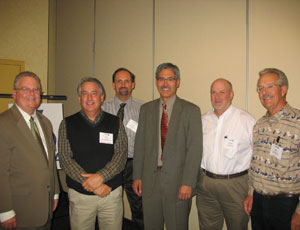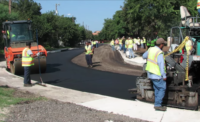Caltrans Director Randy Iwasaki, speaking to an asphalt pavement industry conference, gave a frank assessment of “strained” transportation funding, the importance of the Caltrans-construction industry partnership and green initiatives.

Iwasaki, who took over the top job at the state highway department earlier this year from Will Kempton, delivered the keynote address at the filled-to-capacity California Asphalt Pavement Forum Nov. 12, organized by the California Asphalt Pavement Association, at the Doubletree Hotel in Sacramento.
Addressing one of the chief concerns of the construction industry in a recession economy — highway funding — Iwasaki says, “There’s not a lot of money pouring into the coffers of transportation to deal with this aging infrastructure. You see it every day in the pavement.”
Overall, Iwasaki says, Caltrans estimates it would take about $6.5 billion a year to properly maintain California’s immense surface transportation system, but that only a fraction of that is being spent in any given year.
“Transportation funding is strained,” he says, “and so we have to really watch it.” Funding has been further hampered by the economic downturn, which has curtailed gasoline consumption and subsequently the gas taxes that pay for transportation investment.
“Our economy depends on a safe and efficient transportation system,” Iwasaki says. “If you take a look at ... the growth of VMT (vehicle-miles traveled) over the years, and you look at the growth of the economy in California, they’re pretty much parallel. And you look at today, when VMT is going down, and look at the economy, it goes down.”
But despite the lower revenues available for transportation, the federal economic stimulus bill has helped soften the blow, he adds.
“The Recovery Act, it couldn’t have come at a better time for California,” he says, adding that California currently is able to funnel that money toward 370 projects for $1.26 billion worth of recovery dollars. The total amount California received for streets an highways was $2.57 billion. To critics who charge that the stimulus money has not made it way to projects quick enough, he adds that California has awarded more projects worth more dollars than any other state, but that “you may not see a lot of it because they’re just starting.”
Another factor, he says, is that local projects that may be underway have not yet sought reimbursement from the state.
On other matters, Iwasaki, a 26-year Caltrans veteran, notes the importance of the partnership between Caltrans and the construction industry in delivering the best transportation program possible.
“Partnership — partnering with the construction industry — (is) very important,” he says. “We don’t build anything, the last time I checked. What we do is that we’ll design the projects, we’ll get them environmentally cleared, but the contractors build the projects. And that’s why I try to remind everybody that we work together to build a safe and efficient transportation system.”
And investing in good transportation also makes good economic sense, he notes, citing estimates of between 18,000 and 33,000 jobs that are retained or created for every billion dollars in public works construction.
“Caltrans and our partners ... create jobs,” he says. “We’re good for the economy.” He also voices support for the pavement preservation program, saying it provided a good value for taxpayers with relatively little overhead. He also says the various “green” initiatives Caltrans and the construction industry are advancing, such as the use of Warm Mix Asphalt and more recycled asphalt, are helping road construction and maintenance be more environment-friendly.
Speaking to the conference earlier in the day, Caltrans State Pavement Engineer Dr. Shakir Shatnawi echoed a similar partnership theme, saying, “We’re all in this together. There’s no other way to be.”
Shatnawi also expresses support for the concept of joint Caltrans-industry training and joint certification for asphalt test methods. The conference also featured a presentation by Colorado Asphalt Pavement Association Executive Director Tom Peterson on the successful joint training and certification program underway in Colorado. A joint Caltrans-industry “task group” has recently formed under the auspices of the Caltrans-Industry Rock Products Committee to explore implementing such a program in California.
Tony Limas, technical services manager with Granite Construction, presented the very latest on Warm Mix Asphalt, including a rundown of the various pilot projects that have been done in California. Granite has extensive Warm Mix Asphalt experience in California and across the nation. The National Asphalt Pavement Association estimates that within five years more than half of all asphalt produced will be of the warm mix type, which can be produced at lower temperatures, emits less pollutants and uses less fuel to make.
Skip Brown, president of Delta Construction Co. of Sacramento, and founder of Asphalt Consulting Services, LLC, updates conference attendees on the state of the new Caltrans pavement smoothness specification as it relates to asphalt. Of particular interest is language being hammered out between Caltrans and industry representatives on thin-lift overlays.
Major changes to the Caltrans Section 39 asphalt specification were outlined in detail by Jack Van Kirk of George Reed, Inc., and later dissected in a panel discussion that featured Teichert Aggregates Quality Control Supervisor John Schmidt. CalAPA plans to sponsor a series of seminars around the state to educate contactors and city and county public works agencies of the signification changes to the specification and the impact the changes will have on projects.
Asphalt pavement consult and former CalAPA Executive Director Roger Smith gave a presentation on specialty mixes, including porous pavements and intersection mixes, and Twining Labs Technical Services Manager Tom Carter gave a comprehensive presentation on recycled asphalt pavement (RAP).
The event was sponsored by Granite Construction, Maxam Equipment , MeadWestvaco, Sasol Corp., PQ Corp. and Valero Refining. All conference presentations are available to download at the CalAPA website.


Post a comment to this article
Report Abusive Comment